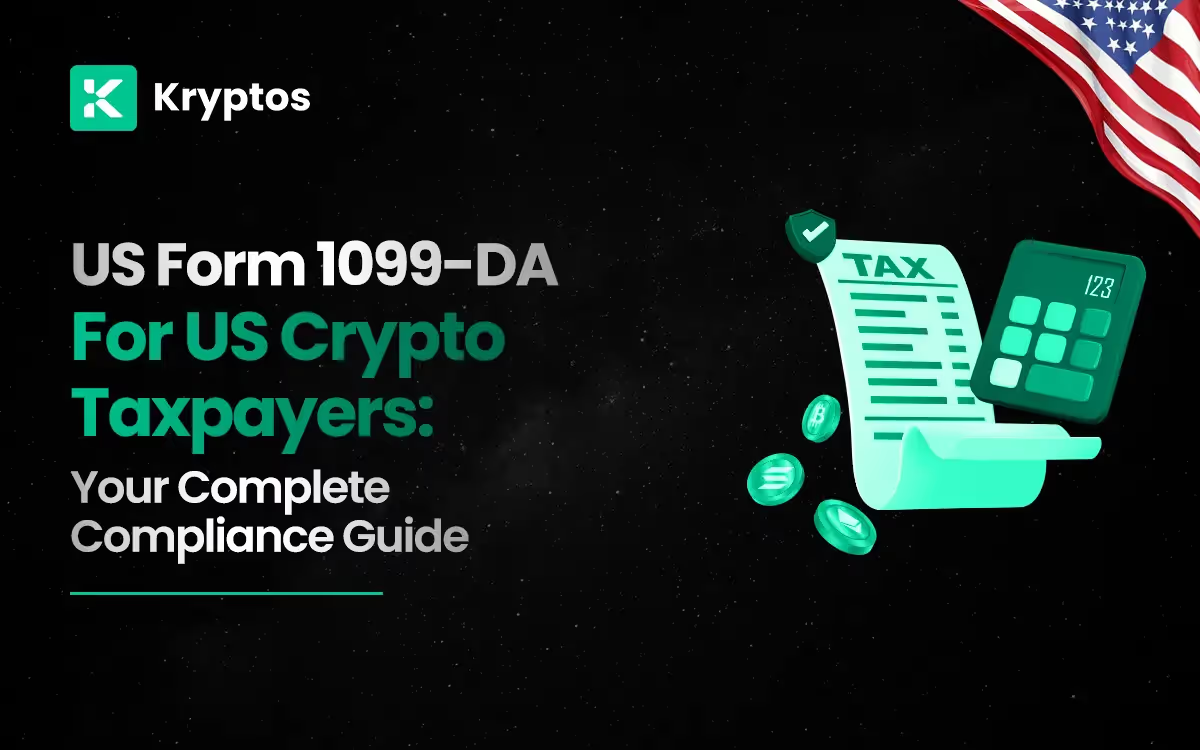.avif)
Calculate Your Crypto
Taxes in Minutes
Introduction
The IRS will introduce Form 1099-DA in 2026 to streamline the reporting of digital asset transactions. This form requires brokers, exchanges, and custodians to report the proceeds from digital asset sales, transfers, or trades. Major exchanges like Coinbase and others have already started preparing for these new reporting requirements to ensure compliance and transparency.
Form 1099-DA will become a vital document for taxpayers during tax season, ensuring accurate cost basis reporting and IRS compliance. As the US regulatory framework around crypto taxation evolves, understanding Form 1099-DA is essential for avoiding reporting errors, penalties, and audits. This guide simplifies everything you need to know about the new form—from its purpose to actionable steps for taxpayers.
What is Form 1099-DA?
Starting in 2026, exchanges will require users to confirm their chosen cost-basis allocation methods, such as Specific Unit Allocation or Global Allocation, and provide any necessary supporting information. This process ensures brokers can accurately report transactions on Form 1099-DA and comply with IRS requirements. IRS Form 1099-DA (Digital Asset Proceeds From Broker Transactions) is a tax form issued by brokers to report:
- The gross proceeds from sales, exchanges, or transfers of digital assets.
- The wallet/account details are linked to the transactions.
- Information to reconcile cost basis with IRS standards.
Brokers will submit this form to both the IRS and the taxpayer, ensuring transparency and alignment with digital asset tax rules. This form is similar to the traditional 1099-B for securities but tailored specifically for digital assets like cryptocurrency, stablecoins, and NFTs.
Who Will Receive Form 1099-DA?
You will receive a 1099-DA if you:
- Sell or exchange digital assets (e.g., Bitcoin, Ethereum, NFTs).
- Transfer digital assets via a broker or platform.
- Engage in taxable crypto transactions on US-based exchanges like Coinbase and others.
The form applies to individual taxpayers, traders, and Web3 businesses that transact digital assets.
Key Timelines for Form 1099-DA:
| Step | Form | Purpose | Action |
|---|---|---|---|
| 1 | 1099-DA | Reports digital asset sales or exchanges | Use to fill out Form 8949. |
| 2 | Form 1099-MISC | Reports miscellaneous crypto income | Use to fill out Schedule 1 or C. |
| 3 | Form 8949 | Details individual transactions | List each transaction here. |
| 4 | Schedule D | Summarizes capital gains/losses | Transfer totals from Form 8949. |
| 5 | Schedule 1 | Reports miscellaneous income | Include miscellaneous income (if not self-employment). |
| 6 | Schedule C | Reports self-employment income | Include self-employment income and expenses. |
| 7 | Form W-2 | Reports wages (if paid in Bitcoin) | Include wages in total income. |
| 8 | Form 1040 | Primary tax return | Summarize all income, deductions, and tax owed. |
| Date | Event/Requirement |
|---|---|
| January 1, 2025 | Brokers begin tracking and reporting digital asset transactions. |
| February 2026 | Brokers issue Form 1099-DA for the 2025 tax year to taxpayers. |
| April 15, 2026 | Deadline for taxpayers to file their 2025 tax returns with IRS data. |
| Timeline Event | Description |
|---|---|
| Before January 1, 2025 | Taxpayers must identify wallets and accounts containing digital assets and document unused basis. |
| January 1, 2025 | Snapshot date for confirming remaining digital assets in wallets and accounts. |
| March 2025 | Brokers begin issuing Form 1099-DA, reflecting a wallet-specific basis. |
| Before Filing 2025 Tax Returns | Taxpayers must finalize their Safe Harbor Allocation to ensure compliance and avoid penalties. |
| Feature | Use Case Scenario | Technical Details |
|---|---|---|
| Automated Monitoring of Transactions | Alice uses staking on Ethereum 2.0 and yield farming on Uniswap. Kryptos automates tracking of her staking rewards and LP tokens across platforms. | Integrates with Ethereum and Uniswap APIs for real-time tracking and monitoring of transactions. |
| Comprehensive Data Collection | Bob switches between liquidity pools and staking protocols. Kryptos aggregates all transactions, including historical data. | Pulls and consolidates data from multiple sources and supports historical data imports. |
| Advanced Tax Categorization | Carol earns from staking Polkadot and yield farming on Aave. Kryptos categorizes her rewards as ordinary income and investment income. | Uses jurisdiction-specific rules to categorize rewards and guarantee compliance with local tax regulations. |
| Dynamic FMV Calculation | Dave redeems LP tokens for Ethereum and stablecoins. Kryptos calculates the fair market value (FMV) at redemption and during sales. | Updates FMV based on market data and accurately calculates capital gains for transactions. |
| Handling Complex DeFi Transactions | Eve engages in multi-step DeFi transactions. Kryptos tracks value changes and tax implications throughout these processes. | Manages multi-step transactions, including swaps and staking, for comprehensive tax reporting. |
| Real-Time Alerts and Updates | Frank receives alerts on contemporary tax regulations affecting DeFi. Kryptos keeps him updated on relevant changes in tax laws. | Observe regulatory updates and provide real-time alerts about changes in tax regulations. |
| Seamless Tax Reporting Integration | Grace files taxes using TurboTax. Kryptos integrates with TurboTax to import staking and yield farming data easily. | Direct integration with tax software like TurboTax for smooth data import and multi-jurisdictional reporting. |
| Investor Type | Impact of Crypto Tax Updates 2025 |
|---|---|
| Retail Investors | Standardized crypto reporting regulations make tax filing easier, but increased IRS visibility raises the risk of audits. |
| Traders & HFT Users | To ensure crypto tax compliance, the IRS is increasing its scrutiny and requiring precise cost-basis calculations across several exchanges. |
| Defi & Staking Participants | The regulations for reporting crypto transactions for staking rewards, lending, and governance tokens are unclear, and there is a lack of standardization for decentralized platforms. |
| NFT Creators & Buyers | Confusion over crypto capital gains tax in 2025, including the taxation of NFT flips, royalties, and transactions across several blockchains. |
| Crypto Payments & Businesses | Merchants who take Bitcoin, USDC, and other digital assets must track crypto capital gains for each transaction, which increases crypto tax compliance requirements. |
| Event | Consequences | Penalties |
|---|---|---|
| Reporting Failure | The tax authorities can mark uncontrolled revenues and further investigate. | Penalty fines, interest on unpaid taxes and potential fraud fees if they are deliberately occurring. |
| Misreporting CGT | Misreporting CGT Error reporting profits or losses can trigger the IRS audit. | 20% fine on under -ported zodiac signs, as well as tax and interest. |
| Using decentralized exchanges (DEXs) or mixers without records | The IRS can track anonymous transactions and demand documentation. | Possible tax evasion fee and significant fine. |
| Disregarding Bitcoin mining tax liabilities | Mining reward is considered taxable income, and failure of the report can be regarded as tax fraud. | Further tax obligations, punishment and potential legal steps. |
| Foreign crypto holdings: Non-disclosure | Foreign-accepted crypto FATCA may be subject to reporting rules. | Heavy fines (up to $ 10,000 per fracture) or prosecution for intentional non-transport. |
Taxpayers must ensure their transaction records align with the details provided on Form 1099-DA to avoid discrepancies.
Why Form 1099-DA Matters for US Taxpayers
The introduction of Form 1099-DA represents a significant shift in crypto taxation. It ensures:
- Improved Accuracy: Brokers must report detailed transaction data, reducing underreporting or misreporting of crypto sales.
- Simplified Filing: Taxpayers can use 1099-DA to reconcile their gains and losses on digital assets.
- IRS Oversight: Mismatches between broker-reported data and personal tax filings could trigger IRS audits or penalties.
For taxpayers, this form ensures greater transparency but also requires diligent recordkeeping to remain compliant.
What Information Will Be Reported on 1099-DA?
Form 1099-DA will include the following details:
- Gross Proceeds: Total amount received from selling, trading, or transferring digital assets.
- Digital Asset Type: Identifies the asset (e.g., Bitcoin, Ethereum, NFTs).
- Transaction Date: Date the sale or transfer occurred.
- Account or Wallet ID: Wallet/address where the assets were held.
- Acquisition Details: Cost basis and purchase/acquisition dates, where available.
Brokers may not always report cost basis if they lack acquisition records, so taxpayers must maintain their detailed transaction history.
Steps to Ensure Compliance with Form 1099-DA
To stay compliant, exchanges will ask users to update their account settings with their chosen allocation methods and provide transaction history details. This proactive step ensures alignment with broker-reported data on Form 1099-DA.
- Maintain Accurate Transaction Records: Track all your crypto purchases, sales, transfers, and trades. Record key details, including cost basis, acquisition dates, wallet IDs, and sale proceeds.
- Reconcile Form 1099-DA with Your Records: Compare broker-reported data on the 1099-DA with your personal transaction logs. Identify any discrepancies and resolve them before filing your tax return.
- File Your Tax Return Accurately: Report all crypto gains and losses on Schedule D and Form 8949. Use Form 1099-DA to cross-check and calculate your final tax liability.
- Use Trusted Tools for Recordkeeping: Platforms like Kryptos simplify transaction tracking, cost basis calculations, and IRS reporting.
Practical Example: How Form 1099-DA Works
Scenario: John, a US taxpayer, sells 2 ETH for $6,000 on a US-based exchange. He originally purchased the ETH for $4,000 six months ago.
The broker tracks the sale and reports it on Form 1099-DA:
- Gross Proceeds: $6,000
- Digital Asset: ETH
- Transaction Date: Sale date
- Cost Basis: $4,000 (if available).
John uses the form to report the sale on Schedule D and calculates a capital gain of $2,000. By maintaining accurate records, John ensures his filing matches the 1099-DA data, avoiding penalties or IRS scrutiny.
Key Takeaways for US Crypto Taxpayers
Form 1099-DA is mandatory for brokers to report digital asset sales and transfers starting in 2026. Taxpayers must:
- Maintain accurate transaction records to align with broker-reported data.
- Reconcile Form 1099-DA details with their tax filings to avoid audits.
- Use tools like Kryptos to simplify cost-basis tracking and ensure compliance.
Why Prepare Now?
The IRS’s Form 1099-DA reflects the growing need for digital asset transparency in the US tax system. Waiting until tax season can lead to:
- Discrepancies with broker-reported data.
- Higher chances of audits and penalties.
- Time-consuming corrections and paperwork.
By preparing now, taxpayers can ensure accurate records for all transactions and stress-free tax reporting with tools like Kryptos. Compliance with evolving IRS requirements for digital assets is easier when tackled proactively.
Simplify 1099-DA Compliance with Kryptos
Staying compliant doesn’t have to be complicated. With Kryptos, you can:
- Automatically track digital asset transactions across wallets and exchanges.
- Accurately calculate cost basis for tax reporting.
- Streamline the reconciliation of Form 1099-DA data with your records.
Prepare for the new IRS requirements with confidence. Get Started with Kryptos Today.
Final Thoughts
IRS Form 1099-DA marks a new chapter in crypto taxation, ensuring brokers and taxpayers align on digital asset reporting. Major exchanges like Coinbase are already preparing for this transition, making it crucial for taxpayers to take action now.
For US taxpayers, proactive preparation, detailed recordkeeping, and the right tools will be key to a smooth tax season. Start preparing today and avoid last-minute stress—Kryptos is here to help you stay compliant and in control of your crypto taxes.
File Your Crypto Tax in Minutes











